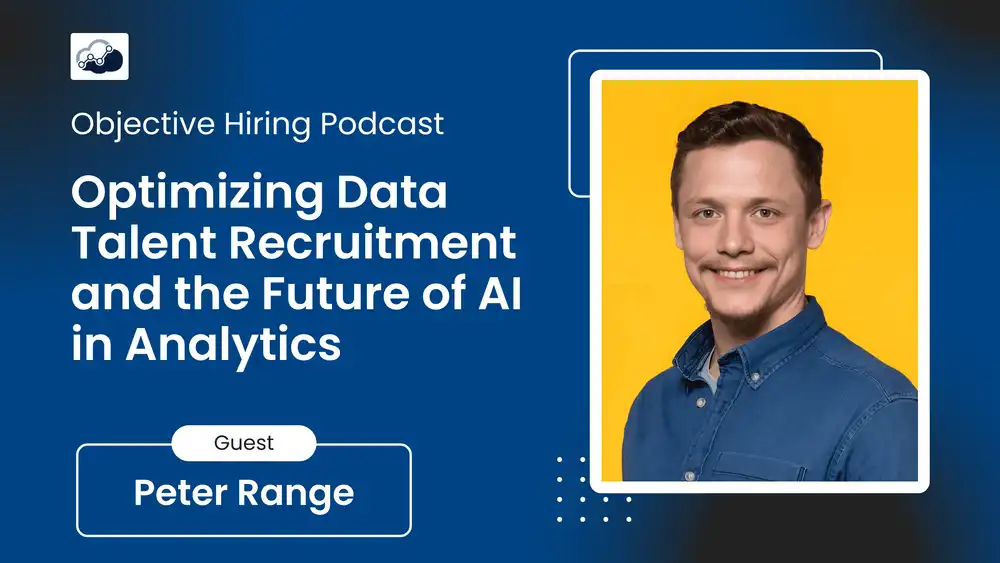Peter Range on How AI is Reshaping Data Careers—and What to Do About It

AI isn’t replacing data professionals. But it is rewriting the job description.
That was the clear message from Peter Range, a data and analytics leader who joined Tim Freestone, founder of Alooba, on the Objective Hiring podcast.
Peter believes the core roles of data engineer, analyst and scientist will still exist in five years—but what they do day to day will be dramatically different.
“I don’t think calculators replaced mathematicians. It just changed the way they worked.”
He draws the analogy between calculators and AI: both increase productivity and lower the barrier to entry. And just like calculators didn’t eliminate math-heavy jobs, AI won’t eliminate data roles. But it will shift them up the value chain.
“It's going to speed up workflows. The biggest impact will be on people who are newest to data—where the skills are least developed.”
Peter expects junior data professionals to feel the heat most. Why hire a junior analyst to run queries when an experienced one with AI tools can do 2x the work?
That pressure on entry-level jobs also means upskilling is no longer optional. It’s the only way to stay ahead.
“If you can talk about LangChain or RAG, rather than just ingestion pipelines, that's going to be where the jobs go.”
Peter’s advice: learn fast, and position yourself on the side of AI augmentation—not competition.
From Entry-Level Threat to Career Accelerator
While AI tools like GitHub Copilot and ChatGPT are already making experienced professionals faster and more efficient, Peter sees it as a double-edged sword for beginners.
“Trying to differentiate yourself from the average business user is going to be difficult with AI. It’s just so much easier to break into data now.”
The bar for entry-level competence is rising. At the same time, the ability to self-serve using AI is empowering non-technical business users to do more analysis themselves. That shift creates both opportunity and risk for centralised data teams.
For hiring managers, this means screening candidates must go beyond checking CVs for buzzwords. Instead, Peter advocates for technical testing early in the hiring process—before even seeing a resume.
“I like to not see CVs until we've been through the technical testing. I’d rather be evidence-led from how they perform.”
It’s a philosophy Alooba shares. With Alooba’s skills assessments, hiring managers can screen for actual ability, not just credentials—particularly important as more candidates rely on AI to polish their CVs or even generate them.
Future-Proofing the Data Stack
Peter also highlighted how AI is reshaping what skills matter. He thinks legacy experience isn’t enough anymore.
“Ten years ago nobody cared about Python. You’d see SAS all the time on job adverts. Things move fast in data.”
It’s not just about what you know—it’s about how fast you can adapt. That’s particularly important for data engineers.
“If all you're calling out on your CV is ETL pipeline experience, and not things like LangChain or tools that are powering AI workflows, you’ll be left behind.”
This evolution puts even more weight on continuous learning. And Peter believes the best data professionals won’t wait for permission—they’ll take the initiative.
“Think about how you can use AI to improve your workflows. Don’t be scared of it—just differentiate yourself in that world.”
Data Democratisation—and Why Governance Still Matters
Peter sees the biggest gain in AI not just in speed, but in access. Non-technical users can now explore data themselves.
“I think democratization is a huge benefit we’re going to see. You just need your data governance in place.”
That means clearer definitions, better metadata, and scalable access policies. Without those, empowering business users to run queries can become a governance nightmare.
It’s a balancing act: use AI to unlock more value from your data, but keep your frameworks tight enough to avoid chaos.
Regulated Industries Will Lag Behind—But Startups Won’t
Peter also warned against applying this AI-augmented mindset uniformly across industries.
“There are so many industries that are so heavily regulated. In the next five years, it’s unlikely they’ll use AI at scale.”
That creates a two-speed world in hiring and tooling. Startups and newer tech firms will embrace AI workflows early. Traditional industries may be slower—but not immune.
“Why would I hire three junior analysts if I could hire a senior with AI that could do at least as much, if not more?”
That dynamic will force everyone—from job seekers to hiring managers—to re-evaluate their strategies.
The Opportunity is Massive—If You’re Ready
Peter’s final takeaway was one of optimism. He sees the coming shift as a huge opportunity for those willing to evolve.
“Everybody’s talking about ChatGPT. But how many are really using it in their professional lives?”
The market will reward those who experiment, learn and adapt early. And organisations that give their teams time to explore AI—rather than fear it—will win.
“If you make the time for your staff to explore these tools and make them less afraid of it, you’ll get the best results.”
It’s a compelling call to arms for data professionals: learn the tools, sharpen your skills, and stay ahead of the curve.
Ready to build a hiring process that keeps up with the AI era? Try Alooba to assess candidates’ actual skills—not just the claims on their CVs.